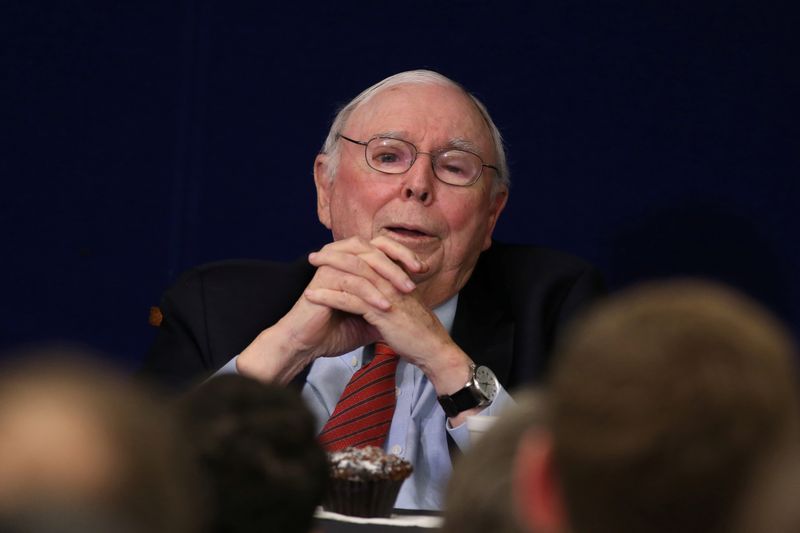By Jonathan Stempel
(Reuters) -The death of Berkshire Hathaway (NYSE:BRKa)'s Charlie Munger heralds the end of an era, leaving Warren Buffett as the conglomerate's lone investing legend and shining the spotlight on managers who have largely operated in their shadow.
Few companies have been so closely associated with their leaders as Berkshire has with Buffett and Munger, who knew each other for more than six decades, the last 45 years as the Omaha, Nebraska-based conglomerate's chairman and vice chairman.
Munger's death on Tuesday, five weeks shy of his 100th birthday, leaves Berkshire Vice Chairmen Greg Abel and Ajit Jain, who respectively oversee its non-insurance and insurance businesses, as the 93-year-old Buffett's top advisers and sounding boards.
They became vice chairmen in 2018, started taking a more prominent public role only at the most recent of Berkshire's annual meetings, and will have bigger boots to fill than at almost any other company.
Managers have said Abel fully embraces Berkshire's culture, which includes an extreme decentralization that gives business units broad autonomy.
That means big units such as the BNSF railroad and Geico car insurer, each with tens of thousands of employees, and small units such as Borsheims jewelry, with about 142 employees, can run without interference from Berkshire headquarters, which employs only about 26 people.
But Abel and Jain have different styles from Buffett and Munger.
At the 2021 annual meeting, Jain was asked how he and Abel interact with each other.
"There is no question that the relationship Warren has with Charlie is unique and it's not going to be duplicated," Jain said. "We don't interact with each other as often as Warren and Charlie do. But every quarter we will talk to each other about our respective businesses."
Abel said he and Jain regularly consulted with one another, and in particular when something unusual was happening at one of Berkshire's businesses.
Investors say they have faith.
"I can’t imagine investors haven't thought about what happens when Buffett is gone as well," said Bill Stone, chief investment officer at Glenview Trust. "You don’t need them to be as good as Buffett or Munger to make Berkshire a good company and arguably a great company."
Berkshire did not immediately respond to a request for comment outside business hours.
CEO-DESIGNATE
Berkshire has had a succession plan since at least 2006 when Buffett, then 75, told shareholders the company he has run since 1965 would be prepared for his departure.
Munger inadvertently signaled during Berkshire's 2021 annual meeting that Abel, a 61-year-old Edmonton, Alberta, native who spent a quarter century at what is now Berkshire Hathaway Energy, was the CEO designate.
Jain, 72, would retain oversight of insurance operations.
Buffett has praised both executives, calling Abel "a first-class human being" in a 2013 video message and referring to Jain as a "superstar."
A lifelong hockey fan, Abel graduated in 1984 from the University of Alberta, worked at PricewaterhouseCoopers and energy firm CalEnergy and joined the company, then known as MidAmerican Energy, in 1992, which Berkshire took over in 2000.
Abel became MidAmerican's chief in 2008 and benefited from its ability, unusual in the utility industry, to retain earnings rather than pay dividends. That freed him to make acquisitions, and expand into renewable energy.
Investors will have to wait until Abel takes over to see his willingness to shed businesses that are underperforming or have mediocre outlooks - his predecessors liked to buy and hold businesses forever - or whether Berkshire might pay its first dividend since 1967.
Jain, who was born in the Indian state of Odisha, has specialized in pricing for risk, especially large risks such as natural catastrophes. He joined Berkshire in 1986.
Besides the two top executives, Berkshire's plan also calls for Buffett's eldest son Howard Buffett to become non-executive chairman, charged mainly with preserving Berkshire's culture.
Todd Combs and Ted Weschler, who help Buffett run Berkshire's $300 billion-plus common stock portfolio - about half of which is in one stock, Apple (NASDAQ:AAPL) - appear in line to take over all of it.
"Berkshire has talented people there that will help with the stock picking," said Bill Smead, chief investment officer at Smead Capital Management in Phoenix. "But it will never be the same."
LOSS OF LEGACY
For shareholders, a signature in Berkshire's universe is its annual meeting, a pilgrimage known as "Woodstock for Capitalists," where Buffett and Munger would answer more than five hours of shareholder questions.
It is a weekend of shopping, investor conferences and events that draws tens of thousands of people to Omaha in early May, even though fans can watch it streamed on their home computers or smartphones.
Many shareholders, especially local, have said they will continue going, but others have been less sure.
"What really glued us to these men was their advice on living a full life by instructing people how to think clearly, to be honest with oneself, to learn from mistakes and to avoid calamities," said Whitney Tilson, an investor who previously ran T2 Partners and Kase Capital and has attended many meetings.

In May 2020, at the height of the pandemic, Buffett held the meeting virtually from Omaha. Munger didn't attend.
"It particularly doesn't feel like an annual meeting because my partner of 60 years, Charlie Munger, is not sitting up here," Buffett said. "I think most of the people who come to our meeting really come to listen to Charlie."